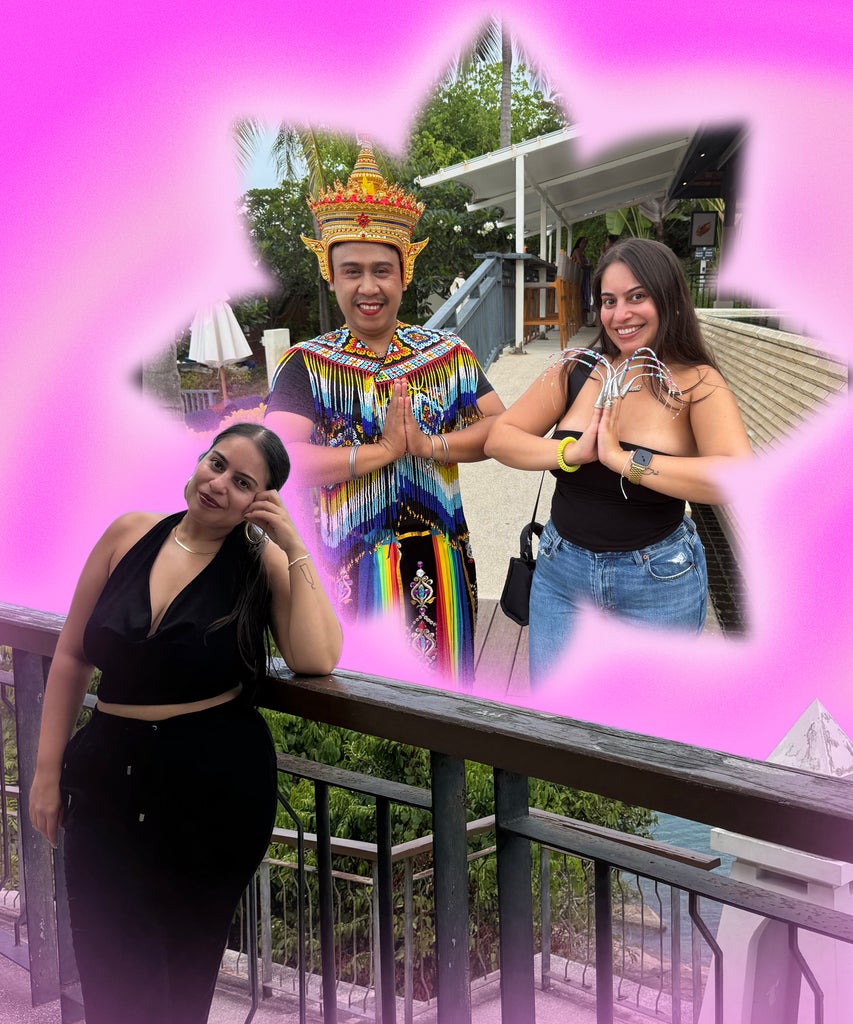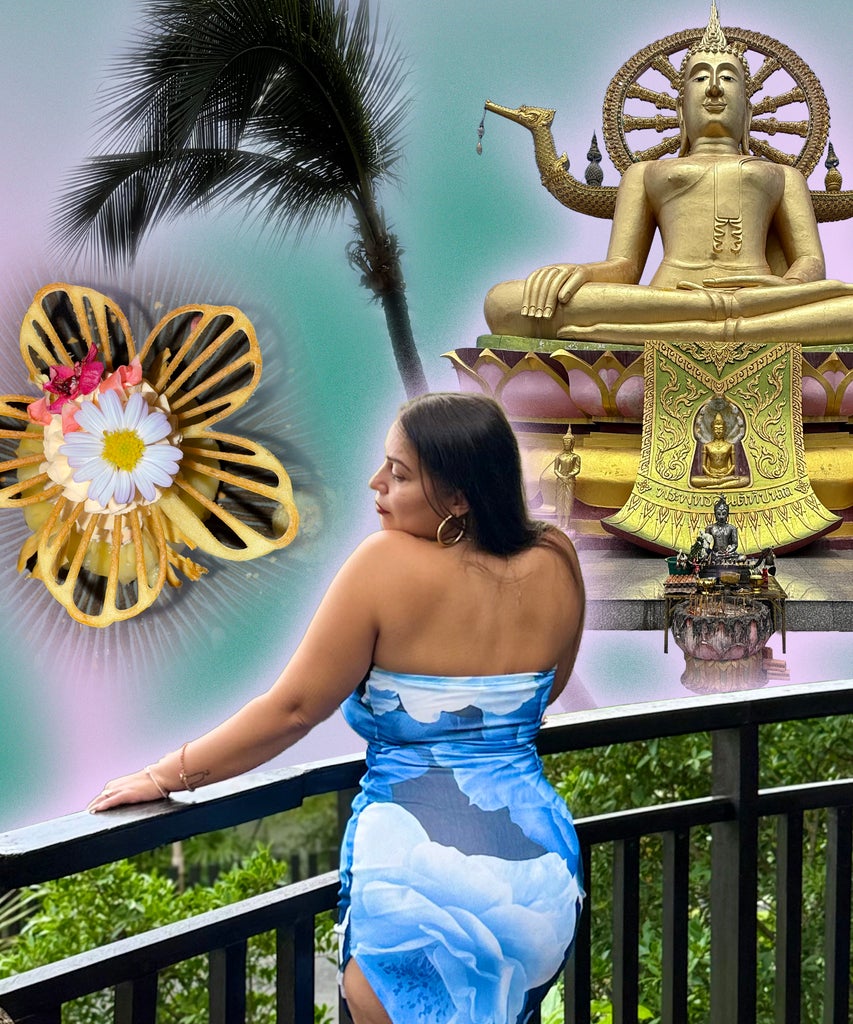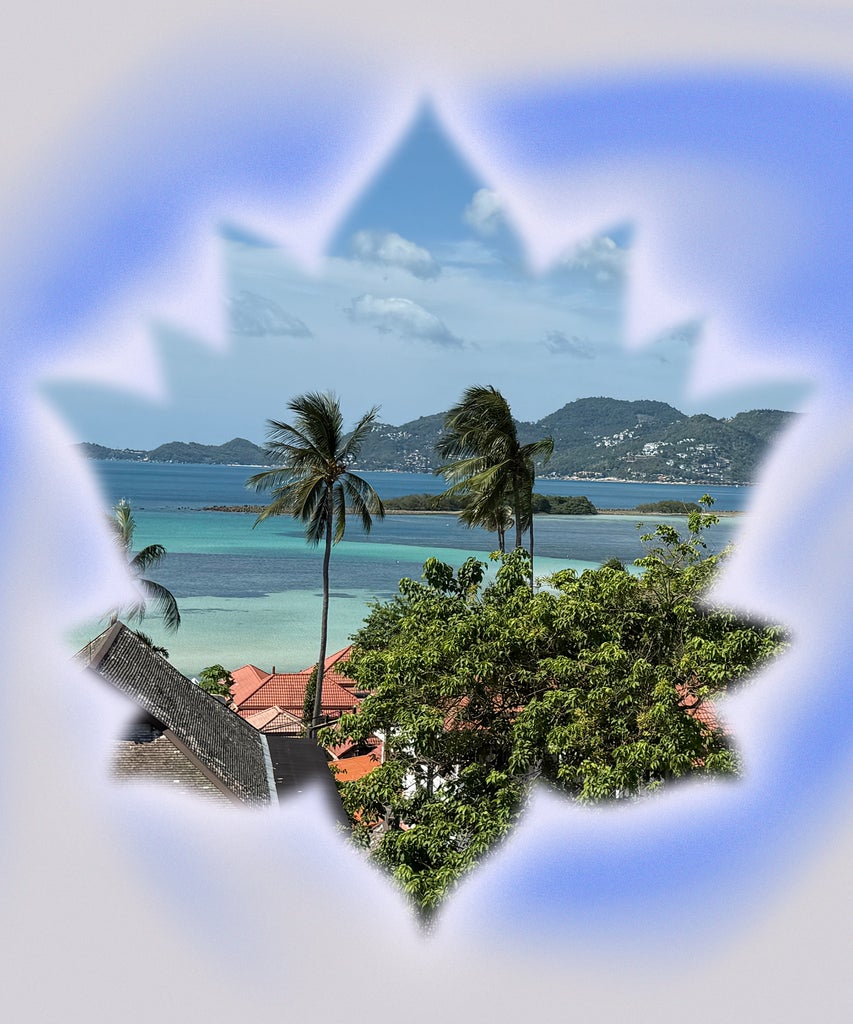
When I received my flights and itinerary for a besties’ trip to Thailand, I immediately called my other half to go over the plan. As long-distance BFFs, we wanted to make every moment together count. On the phone, we revised the schedule, slotting in activities during our six-hour layover at Changi Airport in Singapore and any free days we had in Koh Samui, an island on the southeastern coastline of the Gulf of Thailand. It was the first time either of us was headed to Asia, and we wanted to see as much as we could and do as much as possible. We had five days — 120 hours — and we were determined not to waste a single minute.
But as the first several hours of our adventure together failed to go according to plan, I began to learn an important lesson about time: that the idea of time as something we can structure and control is an illusion, mostly because time, itself, doesn’t actually exist in the way I thought it did.
Day 1 — We Can’t Control Time
Twenty-four hours into our travels, when we made it from Orlando, to San Francisco, to Changi Airport — where we had scheduled a free tour of the city, waterfall gazing at the Rain Vortex, a photoshoot at the Sunflower Garden, a playful walk along Canopy Park, and, of course, a meal at the Michelin-starred Kam’s Roast — we ended up adjusting our overambitious schedule by finding a comfortable place to rest before grabbing a quick bite. What felt like an hour somehow turned into five, and we ultimately jetted to our Bangkok Airways flight to Koh Samui without crossing off a single item from the list we’d meticulously built.
About an hour and a half later, when we arrived at our final destination, we were still spooked by the mysterious speed of time. But we laughed it off and were determined to return to scheduled programming. It was morningtime in Koh Samui, and we were ready to dip into the pale jade waters of Chaweng Beach and take photos in flowy dresses at the jungle-themed Songbird Lounge at our resort, Anantara Lawana Koh Samui, where scenes from White Lotus Season 3 were filmed. Except my friend’s checked luggage didn’t make it with us. Apparently, her suitcase was stuck somewhere in Singapore and we were told it would be located and delivered to our resort by the end of the day. But by then, we’d have lost the sunlight for the beach and the photos.
Once again, our first few hours in Asia — the precious, never-to-return time — would be “wasted,” or so we thought.
“Growing up in the U.S., time often feels like currency, and as a Latina raised in a frugal home, I was taught to not squander anything of value. So, like money, I spent my time ‘wisely.’”
raquel reichard
Growing up in the U.S., time often feels like currency, and as a Latina raised in a frugal home, I was taught to not squander anything of value. So, like money, I spent my time “wisely:” Every hour had a purpose and every day took me closer to a goal. At the time of my besties’ trip, I had already been feeling like I had mispent my time. That summer, I turned 35 years old, and I realized my life was not where I had thought it would be. Sure, I had crossed most items off of my adulthood to-do list, but I had never been able to scratch off motherhood, and it started to feel like time for this milestone was running out. And unlike cash, there was no way I’d get that currency back. On this trip, I was beginning to feel that anxiety again, the feeling that days spent off schedule were days missed and misused.
When we finally arrived at our resort, anxious and exhausted, my thoughts about time began to shift. In Thailand, time doesn’t necessarily move according to the clock. Things begin when they’re meant to. The focus is more on readiness and less on the actual minute hand. This idea showed up from the moment we stepped into our resort. The concierge staff welcomed us with a smile, walked us over to a large ceremonial gong, and invited us to strike it three times. It was a symbolic way of marking our arrival and the beginning of our stay. But it also made something click: whatever time we’d “lost” stressing about luggage or sleeping through layovers didn’t matter. That time had passed, and in that sense, it no longer existed. And now we had time to do what our bodies actually needed us to: freshen up, relax on the king-sized bed in our villa, and beat jet lag so we could actually enjoy the days ahead of us.
Day 2 — We All Experience Time Differently
On the second day, once my friend finally had her suitcase of essentials, we jumped back into our itinerary, which was still patiently waiting for us. It didn’t matter which day we did what, just that we were doing it. Over breakfast at Ocean Kiss, the resort’s breezy beachfront buffet restaurant, we had fresh watermelon juice, Thai iced coffee, tropical fruit, noodles, pastries, and made-to-order omelets. Afterwards, we wandered the resort for some light cardio, passing koi ponds, checking out the tree house restaurant, Tree Tops, we’d booked for later in the week, and stumbling into a rooftop boxing gym with the most stunning island views. Back at our villa, we cooled off in our private pool, enjoying deep catch-ups and hilarious photoshoots. That evening, we also watched a traditional Thai light show on the beach. The performer, barefoot and dressed in a bright red and gold costume, danced ram Thai, a slow movement that’s hundreds of years old and was originally performed in royal courts and religious ceremonies.
That night, I noticed my phone said the year was 2568. The month and day were correct, but the year was 543 years ahead. I was confused, so, naturally, I looked into it. I learned that Thailand uses the Buddhist calendar, which is five centuries ahead of the Gregorian calendar most of the world uses. What we call 2025 is 2568 in Thailand. That’s because their year zero is tied to the death of the Buddha rather than the birth of Christ.
“Time isn’t fixed. It’s cultural and, thus, made up. We mark it based on what we value, whether that’s religious figures, harvest seasons, fiscal years, school schedules, or birthdays. … It’s just one way to move through life, meaning there must also be other ways to do so.”
raquel reichard
While I joked to my family back home that I was both 12 hours ahead of them and hundreds of years in the future, it also reminded me that time isn’t fixed. It’s cultural and, thus, made up. We mark it based on what we value, whether that’s religious figures, harvest seasons, fiscal years, school schedules, or birthdays. But it’s still just a framework. The calendar we use, the milestones we aim for, and the pace we’re told to keep aren’t universal. It’s just one way to move through life, meaning there must also be other ways to do so.
Day 3 — Time Is Cyclical, Not Linear, So It Can’t Run Out
The next morning, we went on a “Best of Samui” city tour with a local guide who drove us to several cultural and spiritual sites around the island. Our first stop was Wat Plai Laem, a colorful, modern temple that blends Thai, Chinese, and Hindu iconography. We saw a striking statue of Guanyin, the 18-armed goddess of compassion; a Laughing Buddha representing abundance and joy; and intricate depictions of Hindu deities like Ganesha, the remover of obstacles.
After that, we headed to Wat Phra Yai, better known as the Big Buddha Temple. We climbed 73 steps to reach the massive seated Buddha, which stands about 40 feet tall and overlooks the island from a raised platform. After paying our respects, praying, and taking in the gold-plated statue surrounded by lotus blossoms and prayer bells, our guide struck up a conversation about the Thai calendar, noting that it was the year 2568 and that, for many Thai people, especially practicing Buddhists, time is seen as cyclical instead of linear.

He explained that in Western culture, time is often thought of as a straight line: you’re born, you grow up, you hit certain milestones, and eventually you die. It’s forward-moving and goal-oriented. But in Thai Buddhism, time isn’t something you race through. It moves in cycles: life, death, rebirth, and spiritual progress. Basically, you don’t have to accomplish everything in one lifetime, so there’s no sense of being “too late” or “running out of time.” There’s just where you are now and where you’re headed, eventually. As two women in our mid-30s who had been feeling the pressure of time, this concept felt both comforting and freeing.
Next, we visited Hin Ta and Hin Yai Rocks, famous for looking like male and female genitalia (yes, really). It was a quick stop and a very popular photo op, but our guide told us that the rocks had taken on these shapes naturally and slowly by wind and sea erosion over thousands of years. It was another reminder that time, when left alone, unrushed, and without a deadline, creates its own beautiful and worthy story.
“In Thai Buddhism, time isn’t something you race through. It moves in cycles: life, death, rebirth, and spiritual progress. Basically, you don’t have to accomplish everything in one lifetime, so there’s no sense of being ‘too late’ or ‘running out of time.’”
raquel reichard
Finally, our last stop was Wat Khunaram, where the body of a mummified monk named Loung Pordaeng is displayed in the same seated meditation position he died in decades ago. His body has barely decayed, and his hair and teeth are still intact. For Buddhists, death isn’t an endpoint. It’s just another phase. The emphasis is on how you live rather than on how long you lived. According to our guide, the monk had told his followers that if his body remained preserved, it would be a sign that he had reached enlightenment, the Buddhist state of Nirvana, where suffering ends and the cycle of rebirth breaks, leaving behind only clarity, compassion, and spiritual liberation. I appreciated seeing death presented as something still unfolding rather than an end.
Day 4 — I Am Exactly Where I Need To Be at This Time in My Life
The next day, we learned that the full-day snorkeling trip we had planned for Koh Tao and Koh Nangyuan had been canceled due to an incoming storm. Normally, this would’ve felt like a wasted day. But by then, after three days in Thailand both learning and witnessing how differently time is experienced, I didn’t panic. Instead, my friend and I had a long breakfast and then walked down to Chaweng Beach.
She hiked along the rocks, and I stayed behind to meditate in the still waters. Around me, tourists enjoyed each other’s company: a British family of three played “Marco Polo” and a large group of Arab relatives laughed during what seemed like a family reunion. At one point, I noticed a little girl drifting too far into the water and waded in to carry her back to her father. He thanked me for being at the “right place at the right time.”
“For most of my life, I’ve treated time like something to be managed, maximized, and spent. But moments like that reminded me that I’m always exactly where I need to be, even when things don’t go as planned, maybe especially then.”
raquel reichard
There was that word again. For most of my life, I’ve treated time like something to be managed, maximized, and spent. But moments like that reminded me that I’m always exactly where I need to be, even when things don’t go as planned, maybe especially then. If something doesn’t happen when I thought it would — whether it’s a trip, a relationship, or a phase of life — it’s not that time is running out but that it just wasn’t time yet.
Day 5 — Time Is Meant to Be Experienced, Not Rushed Through

On our last day, my friend and I participated in Chef Lat’s Island Organic Farm Thai Cooking Class, the first farm-to-table cooking class on Koh Samui. The four-hour experience started with a guided tour of Chef Lat’s lush organic micro‑farm, where she cultivates more than 70 varieties of Thai herbs, vegetables, and fruits, including galangal, kaffir lime, lemongrass, and moringa. With freshly picked produce in hand, we moved to our stations in the open‑air Thai cookery kitchen and got to work. We started with a refreshing butterfly pea flower herbal drink, followed by four classic Thai dishes: Pad Thai Prawn, Tom Yum Prawn, Penang Chicken, and Som Tum (papaya salad).
Even in the comically high-pressure kitchen, there was another lesson about time. As Chef Lat reminded us, we wouldn’t rush the layering of flavors in the curry or speed up the pounding of herbs in the mortar and pestle. Thai cooking, like much of Thai life, demands time and presence. It’s not about finishing quickly but rather about being deliberate, staying focused, and honoring each step in the process. Just like in life, slowness isn’t inefficiency. It’s care, presence, and intention. It’s less about squeezing as much as we can into an hour and more about actually being in the hour.
“If time is relative, then it’s not absolute. And if it’s not absolute, then it can’t really run out.”
raquel reichard
With that, my bestie and I returned to our resort for a 60-minute full-body massage followed by a 30-minute Indian head massage. We locked our phones in a safe, leaving the 24-hour clock behind with them. A gong was struck when we began and again when we were finished. But for the time in between — when our therapists used warm coconut oil to smooth out the tension in our shoulders, backs, and scalps — we were fully present.
I grew up believing time was linear, fixed, and constantly slipping away. It was something I had to beat, never fall behind from, or catch up to. But Thailand reminded me that time is a human invention. It’s experienced differently across cultures and even across seasons of life. But if time is relative, then it’s not absolute. And if it’s not absolute, then it can’t really run out. With that, maybe I haven’t missed anything. Maybe I’m not behind at all. Maybe, like everything else on this trip, I can trust that I will arrive exactly when I’m meant to.
Travel and accommodations for this story were provided by Expedia. Reporting and opinions remain independent.
Like what you see? How about some more R29 goodness, right here?






